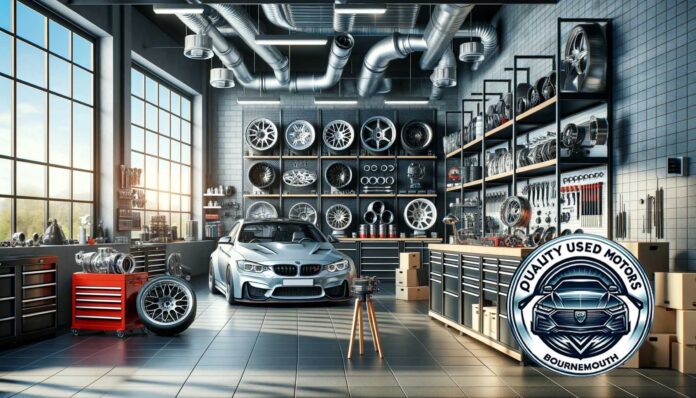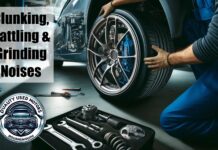Aftermarket parts are manufactured and supplied by entities other than the original equipment manufacturer (OEM) of the vehicle. These parts are designed to function as replacements or enhancements for the original parts and are available for nearly every system in your vehicle, from the drivetrain and exhaust to the electronics and interior components.
One of the primary advantages of aftermarket parts is their cost-effectiveness. Generally, they are less expensive than OEM parts, making them an attractive option for car owners looking to manage their maintenance and upgrade expenses efficiently. Moreover, due to the competitive nature of the aftermarket parts industry, these components often meet or exceed the quality of their OEM counterparts. This competition not only drives down prices but also fosters innovation, leading to parts that can offer superior performance or additional features.
However, the varied quality among aftermarket parts demands a discerning eye from consumers. The UK auto industry, known for its stringent standards and diverse market, offers a microcosm of the global aftermarket landscape, complete with its challenges and opportunities. To navigate this space effectively, it’s essential to understand the nuances of aftermarket parts, including their types, certification processes, and how they compare to OEM parts.
The Do’s of Aftermarket Parts
When navigating the aftermarket parts sector, it’s crucial to apply an approach informed by facts and real-world examples. This not only aids in making more educated choices but also helps in understanding the practical implications of these decisions. Below, we expand on the key do’s with tangible examples, providing clearer insights into the UK automotive aftermarket landscape.
Conduct Thorough Research
Effective research is your best tool in selecting aftermarket parts that offer reliability and value.
– Identify Quality Brands: Brands like Bosch, known for their electrical components, and Brembo, a leader in brake systems, are exemplary in the aftermarket industry. Bosch’s spark plugs and Brembo’s brake pads are widely respected for their quality and durability, often outperforming OEM parts in independent tests. Engaging with automotive forums such as PistonHeads or the Automotive section of TheStudentRoom.co.uk can provide firsthand accounts of these brands’ performance on UK roads.
– Verify Compatibility: A notable example of the importance of compatibility comes from the introduction of advanced driver-assistance systems (ADAS) in modern vehicles. Parts like windshields, which may need to accommodate cameras and sensors for ADAS, underscore the need for precise compatibility. An aftermarket windshield compatible with a 2018 Mercedes-Benz C-Class’s ADAS, for example, must not only fit the frame but also support the technology’s functionality without interference.
Opt for Certified Parts
Certification is a hallmark of quality and safety in the aftermarket parts industry.
– Seek Recognized Certifications: The Thatcham Quality Assurance certification is a benchmark for aftermarket parts in the UK, ensuring they meet rigorous safety and quality standards. For instance, Thatcham-certified body panels have been tested to assure perfect fitment and resistance to rust, matching or surpassing OEM specifications. Such certifications reassure consumers that the parts they are purchasing are not only safe but also endorsed by leading industry experts.
Evaluate the Cost versus Benefit
Understanding the real value of aftermarket parts involves looking beyond the sticker price.
– Assess Longevity and Performance: Consider aftermarket alloy wheels from brands like OZ Racing, which offer enhancements in both aesthetics and performance. These wheels are not only lighter than many OEM wheels, potentially improving fuel efficiency and handling, but their durability also means they might outlast cheaper alternatives. This exemplifies how upfront costs can be offset by longer-term savings and performance benefits.
– Understand the Total Cost of Ownership: Installing a high-quality aftermarket exhaust system, such as those from Akrapovič, can offer tangible benefits in performance and sound. However, it’s also a prime example of considering the total cost of ownership. Such a system might improve engine efficiency and performance, potentially translating to savings in fuel and a higher resale value for enthusiasts. This underscores the importance of evaluating how an aftermarket part can contribute to or detract from the overall value of the vehicle over time.
The Don’ts of Aftermarket Parts
While the aftermarket sector offers enticing opportunities for customization and cost savings, there are critical pitfalls to avoid. These don’ts focus on ensuring safety, preserving your vehicle’s warranty, and managing insurance costs effectively. By understanding these areas, you can make more informed decisions that protect both your vehicle and your financial interests.
Don’t Compromise on Safety
The safety of your vehicle should always be paramount, particularly when considering replacements for critical components.
– Critical Components: Items such as brake pads, airbags, and suspension parts are integral to your vehicle’s safety systems. An illustrative case involves aftermarket brake pads that may fit a popular model like the Volkswagen Golf. While many aftermarket options exist, not all are created equal. Brands such as Pagid have established reputations for quality and safety in the UK market, offering products that meet or exceed the performance of OEM parts. However, lesser-known brands might not provide the same assurance. Therefore, unless you’re opting for aftermarket parts with well-documented safety credentials, it’s advisable to prefer OEM parts for these critical systems.
Don’t Overlook Potential Warranty Issues
Your vehicle’s warranty is a valuable asset, and understanding how aftermarket parts can affect it is crucial.
– Warranty Impact: The fitment of aftermarket components, particularly those that significantly alter the vehicle’s performance or safety characteristics, can sometimes void manufacturer warranties. For example, adding a high-performance turbocharger to a Ford Fiesta might enhance its speed and power, but if this modification leads to engine failure, the warranty might not cover the repairs. It’s essential to review your warranty documentation carefully and discuss any planned modifications with your dealer or a certified mechanic who can advise on the potential implications for your warranty coverage.
Don’t Ignore the Potential for Increased Insurance Rates
Modifications to your vehicle can have unintended consequences on your insurance premiums.
– Insurance Considerations: Adding aftermarket parts like a body kit or performance exhaust to your Audi A3 can make it more attractive and potentially faster, but these changes might also be viewed as increasing the risk profile of the vehicle by insurance companies. This perception could lead to higher premiums. In some instances, insurers require notification of any significant modifications from stock, and failure to comply can result in denied claims. Before proceeding with modifications, it’s wise to consult with your insurance provider to understand how these changes might affect your policy and rates.
Top 10 Aftermarket Parts UK Suppliers

Navigating the aftermarket parts industry in the UK involves knowing where to source high-quality components. Here’s a factual list of the top 10 aftermarket parts suppliers available in the UK, each with a brief description:
1. Euro Car Parts: As the UK’s largest distributor of car and van parts, Euro Car Parts offers a vast range of high-quality parts for all makes and models, ensuring wide accessibility and choice for consumers.
2. GSF Car Parts: With a strong presence across the UK, GSF Car Parts supplies both trade and retail customers with a wide variety of car parts and accessories, emphasizing quality and affordability.
3. Halfords: A well-known retail giant, Halfords provides a wide range of car parts, tools, and accessories, along with expert advice and fitting services, catering to DIY enthusiasts and professionals alike.
4. Parts Alliance: Operating a group of locally managed distribution and retail operations, Parts Alliance supplies automotive parts to the independent garage sector, offering a blend of personal service and a wide product range.
5. Motor Parts Direct: MPD is the largest independent auto parts distributor in the UK, known for its extensive product range, knowledgeable staff, and commitment to customer service.
6. Allparts Automotive: Allparts Automotive stands out for its comprehensive selection of premium automotive parts and accessories, serving both trade and retail customers across the Southeast of England.
7. Autoparts UK: Offering over 20,000 car parts and accessories across the UK, Autoparts UK is known for its quality products, competitive pricing, and knowledgeable customer service.
8. Wilco Direct: With a focus on providing quality car parts and accessories to the UK market, Wilco Direct offers both in-store and online shopping options, catering to a broad range of automotive needs.
11. Online Car Parts: This digital storefront is a treasure trove for car owners and enthusiasts alike, offering an extensive catalogue of high-quality aftermarket parts. With an easy-to-navigate website and detailed product listings, Online Car Parts simplifies the process of finding and ordering the exact components you need for your vehicle.
12. Parts In Motion: With a commitment to quality and customer satisfaction, Parts In Motion stands out for its comprehensive selection of automotive parts and accessories. Their focus on providing a seamless shopping experience, coupled with expert support, makes them a trusted source for both DIYers and professional mechanics looking to source reliable aftermarket parts.
These suppliers represent the best of the UK’s aftermarket parts industry, providing a wide range of options for consumers looking to repair, maintain, or upgrade their vehicles with confidence.
Navigating Aftermarket Parts: A Guide from Quality Used Motors
As we wrap up our guide into the world of aftermarket parts, I’d like to share a bit of personal advice that I’ve gathered over my years in the auto industry. It’s been a journey of learning, from the excitement of discovering cost-saving options to the critical lessons learned from facing the realities of quality, safety, and the fine print of warranties and insurance.
The truth is, choosing aftermarket parts is as much about understanding what’s under the hood of your car as it is about understanding the industry itself. It’s a landscape filled with potential treasures and pitfalls, and navigating it successfully requires a blend of savvy research, keen insight, and a touch of scepticism.
First and foremost, do your homework. I can’t stress this enough. Dive into forums, read reviews, and don’t hesitate to ask for advice. The collective wisdom of the car enthusiast community is invaluable, and brands like Bosch and Brembo didn’t build their reputations overnight. They earned them through consistent quality and performance that people like you and me noticed and appreciated.
When it comes to parts that are crucial to your safety—think brake pads or airbags—I’m a firm believer in erring on the side of caution. While there are certainly high-quality aftermarket options out there, ensuring they meet or exceed OEM standards is essential. And when in doubt, remember, that saving a few pounds isn’t worth compromising your safety.
Another lesson I’ve learned is to always consider the long game. It might be tempting to go for a cheaper part now, but what will it cost you in the end? Will it wear out sooner, potentially leaving you stranded or, worse, unsafe? A part that extends the life of your vehicle and enhances its performance is worth its weight in gold.
Lastly, keep in mind the bigger picture. How will your choices impact your warranty, your insurance, and the overall value of your vehicle? These considerations might seem tedious now, but they’re crucial for making decisions that you won’t regret down the line.
In closing, my aim has been to share insights that empower you to make informed choices about aftermarket parts, enhancing your vehicle’s performance and value without compromising its integrity. The journey of maintaining and improving your car is a rewarding one, filled with learning and opportunities to express your individuality and automotive passion. With a thoughtful approach and a bit of expert insight, you can navigate the aftermarket world like a pro, making choices that keep your car running smoothly and safely for years to come.








